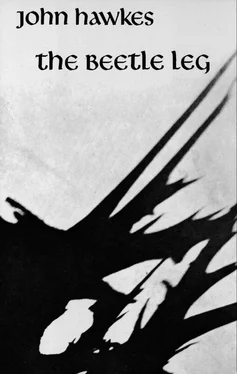John Hawkes - The Beetle Leg
Здесь есть возможность читать онлайн «John Hawkes - The Beetle Leg» весь текст электронной книги совершенно бесплатно (целиком полную версию без сокращений). В некоторых случаях можно слушать аудио, скачать через торрент в формате fb2 и присутствует краткое содержание. Год выпуска: 1951, ISBN: 1951, Издательство: New Directions, Жанр: Современная проза, на английском языке. Описание произведения, (предисловие) а так же отзывы посетителей доступны на портале библиотеки ЛибКат.
- Название:The Beetle Leg
- Автор:
- Издательство:New Directions
- Жанр:
- Год:1951
- ISBN:978-0811200622
- Рейтинг книги:4 / 5. Голосов: 1
-
Избранное:Добавить в избранное
- Отзывы:
-
Ваша оценка:
- 80
- 1
- 2
- 3
- 4
- 5
The Beetle Leg: краткое содержание, описание и аннотация
Предлагаем к чтению аннотацию, описание, краткое содержание или предисловие (зависит от того, что написал сам автор книги «The Beetle Leg»). Если вы не нашли необходимую информацию о книге — напишите в комментариях, мы постараемся отыскать её.
The Beetle Leg
Newsweek
The Beetle Leg
The Beetle Leg — читать онлайн бесплатно полную книгу (весь текст) целиком
Ниже представлен текст книги, разбитый по страницам. Система сохранения места последней прочитанной страницы, позволяет с удобством читать онлайн бесплатно книгу «The Beetle Leg», без необходимости каждый раз заново искать на чём Вы остановились. Поставьте закладку, и сможете в любой момент перейти на страницу, на которой закончили чтение.
Интервал:
Закладка:
The day shift of the Metal and Lumber Company had stopped work an hour ago, and now the cowboy drove his team without the firing of the riveters or torches blasting sand from the air. For a moment the sun touched the black mounds of earth behind the tower and drifted off, down the almost dry channel as far as he could see, where once the wide river would have lost its mud color and changed to orange, then purple, in the days before Mistletoe even existed and when the fishing was good any place he sat down to cast.
When he heard a shrill faraway whistle in Clare, twenty miles away, he climbed down, unhitched the team, left the old machine for the night still dropping a few seeds, and let the horses tug him easily toward home on the end of the reins. For a whole day he had been sowing flowers, back and forth, on the mile long stretch of his brother’s grave, and now the horses were tired and he was thirsty. Man and animals cut down from the crest of the dam to the high weeded plateau, basined in the rear by the long gravel approach and fronting on the filled in section of the horseshoe town. Soon the crest would be topped with a macadam road and the street lamps, if ever wired and the last switches installed, would be lit against the horizon.
The four brown dray horses chomped slowly across the dry track, swaying in the rear but shaking their round noses and twitching their ears in excitement, stumbling now and then in a hole by the road so heavily that it seemed they must fall. Passing one prong of the few hundred brown houses of Mistletoe, Luke Lampson waved to the Finn, a crippled ex-bronc rider hammering on a stoop with two white canes.
Then, digging his long heels into the turf, he pulled the horses as a station wagon swung close, raising the dust. He waved again, this time at the tin helmeted Metal and Lumber night shift men, setting off to throw sparks from the tower until dawn. He followed the thin sticks hung from a string of barbed wire through the darkening fields, slapping at the mosquitoes that bit through his pants, until, after once more placing a few light logs across the gate, he could look down on the plank and tar paper buildings of his ranch. He turned the horses loose and they trotted downhill, for all their age like young dogs.
“Slow down there,” he called, afraid that they would hit the wire in the darkness and skin open their broad two-sided chests. He splashed water on his face at the washstand by the house and looked over the bare country toward Mistletoe. He could see the light of fine sparks from the tower; they were at work already.
Only a few mile twists of wire sheared the damp land into fields and made it claim to a farm, a ranch, a fallen barn. Phosphorescent clumps of weed and sage rolled airily in sight, but lone animals moved invisibly though a hoof click on stone carried for miles through the warm evening.
Mosquitoes beat against the inside and outside of the windows and Luke Lampson’s horses thudded out of range of the house and, motionless, hung their heads over the furthest stretch of wire. Luke stomped up the steps, two potato sacks filled with sand, pushed open the door wobbling on leather hinges, and walked across the leaning floor to the bunk on his bowed, tightly denimed, tired legs.
“Evening, Ma,” he said and pulled off the cracked, square-toed, lady-size cowboy boots. And, more tiredly, under his breath:
“Evening, Maverick,” and he glanced once at the Mandan who squatted by the dusty blanket hanging from the foot of the bunk. The black hair hung over her face.
The woman at the wood stove shook the skillet and it spit on the red iron.
“What’s the matter, Ma, you out of sorts?”
“Not so’s anybody’d see.”
Luke lay back on the pile of covers and, lighting a short end of cigarette, flipped the wooden match to a tin can of water on the far side of the room. A pair of antlers, patches of hair and dried skin stuck to the yellow bone chip of skull, hung crookedly on the wall above the can. An old branch lay cradled in the horns. Luke rubbed his feet together — even in summer he wore thick-woven socks — and, with the toes of one foot sticking through a long raveling hole, scratched. The Mandan, crouching out of sight and never smiling, reached up one dark arm and with a long stem of hay tickled at the bare toes. But the black little feet, tough with rocks and hot with sand, did not feel it. He went on smoking.
“At least you could make her help. Me doing all this heavy work.”
“Go on, Maverick, give her a hand.”
The Indian climbed slowly to her feet, pulled down her red sweater, smoothed her faded, straw covered plaid skirt and padding to the open shelves, reached for thick lipped cups and plates. Her charm bracelets jangled as each piece of china was set heavily on the dark planks of the table. She kept out of the stove woman’s way.
“That’s the one job I like doing myself.” Ma splattered onions in the pan. “Light work. And I never get to do it.”
“Go fetch some water,” Luke said to the girl. “Shut the door,” he called. It remained open and mosquitoes hummed in and out.
“I ain’t here the whole day long,” Luke swung his feet to the floor. “I don’t see what’s to keep you from sprawling right here on this bunk from sunup to dark. If you want.” Luke’s face, black with the sun, would fit a palm of the woman’s hand and when he rocked across the floor it caught the fire from the stove. He rolled like a child playing sailor, loosening his neckerchief.
Ma shook her head. “That’s where she sneaks off to. I couldn’t do it.” The Mandan returned with the load of water; she carried the bucket almost as lightly as the older woman, who could lug six brimming gallons the whole mile long trail as easily as two pint jars of honey. Reaching under the bunk, the Indian pulled out her dusty, high heeled, patent leather store shoes. She squeezed them onto bare feet and sat down to table. She ate from the edge of the knife, her black sides of hair falling into the bowl of food. Now and then she watched the cowboy scowling into his mug behind the hurricane lamp.
Ma never sat to any meal. She kept her back to the world and her face toward the red range, toward the cartons of matches, the row of pans and long handled forks. Sometimes she pushed the lid off the skillet and stole a bite on a long blackened prong or a sip from a wooden spoon. She refilled their plates without turning around. But the Mandan had to pour the coffee.
The deep dish skillet, as big around as a butter tub, was never off the stove and the flames were never allowed to die from under it. The fat was rarely changed and it boiled and snapped from one month to the next. Whether it was a piece of fish dropped into it or a slab of beef pulled out, it tasted of the black countryside. Tempered by the heat of wood coals, warming the room itself in winter, the skillet was slated over with layer on layer of charred mineral, encrusted with drippings, accumulating from the inside out fragments of every meal. Not a night went by but what Ma, quickly awakened in the darkness, got up to feed the fire and make sure the skillet burned. It was Ma’s pot, the iron of her life, to which came the pickings of her garden, the produce of her monthly shopping trips to Clare, the eggs she got each morning from the coop and whatever Luke might bring home at night — rhubarb, apples or a quarter head of cabbage. She kept it steaming.
Ma was not Luke Lampson’s mother. Hattie Lampson now lay buried on the bluff where once the tents were pitched. Ma had married, to the south in Clare and when the project was first conceived, Luke’s older brother, the Lampson incarcerated in the dam. Sometimes, rarely, wearing rubber boots and a shawl and carrying an egg basket, she would walk the high shoulder of mud, rock and gravel, and look down the water toward the badlands.
Читать дальшеИнтервал:
Закладка:
Похожие книги на «The Beetle Leg»
Представляем Вашему вниманию похожие книги на «The Beetle Leg» списком для выбора. Мы отобрали схожую по названию и смыслу литературу в надежде предоставить читателям больше вариантов отыскать новые, интересные, ещё непрочитанные произведения.
Обсуждение, отзывы о книге «The Beetle Leg» и просто собственные мнения читателей. Оставьте ваши комментарии, напишите, что Вы думаете о произведении, его смысле или главных героях. Укажите что конкретно понравилось, а что нет, и почему Вы так считаете.












